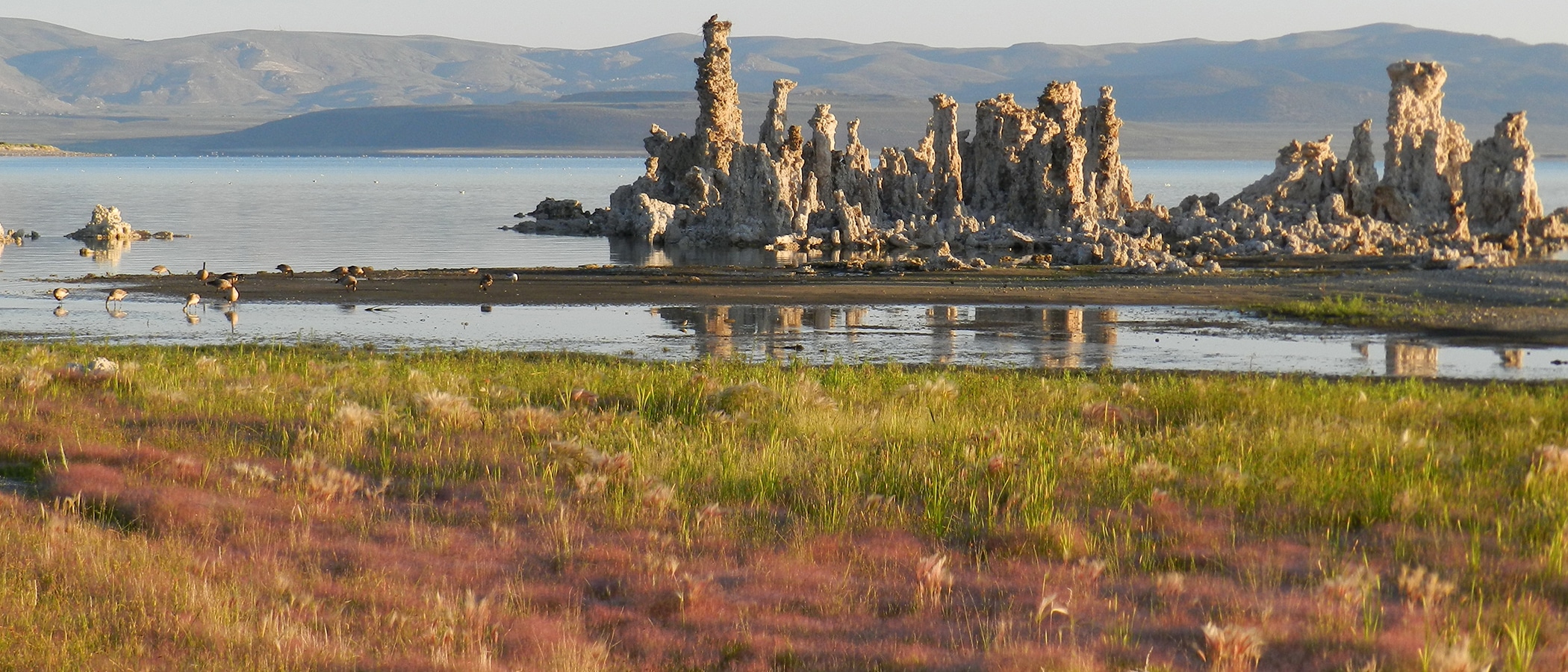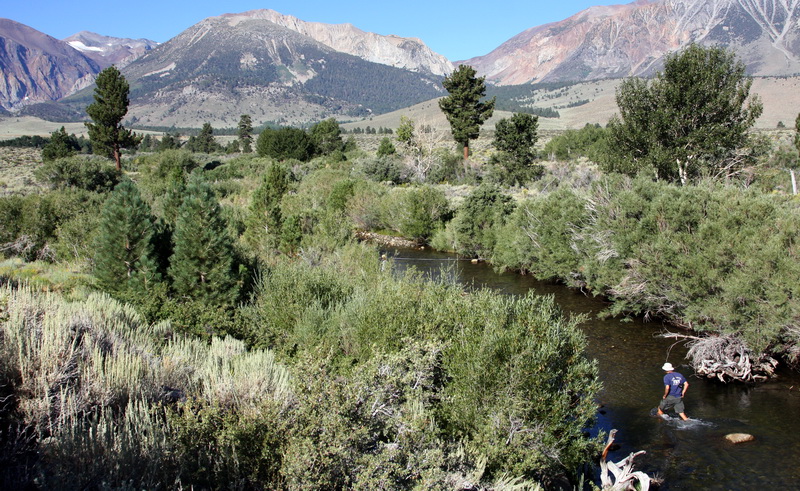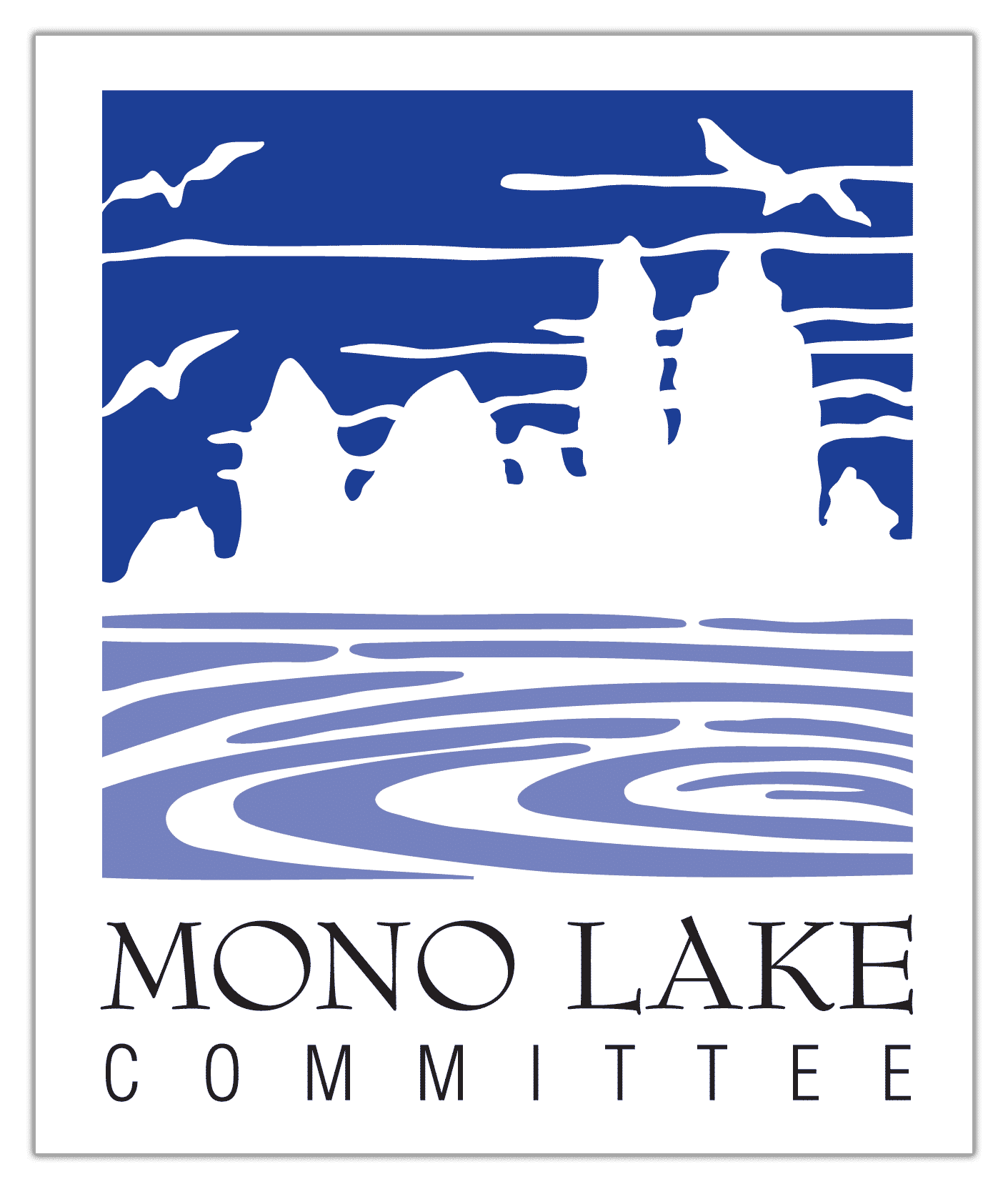
The Mono Lake Committee is thrilled to announce the completion of an innovative agreement with the Los Angeles Department of Water & Power (DWP) that will result in a significant leap forward in restoration of the health of fisheries, streamside forests, birds, and wildlife on 19 miles of Mono Basin streams, all without reducing water exports to Los Angeles.
A key element of the agreement, reached jointly with CalTrout and the California Department of Fish and Wildlife, is DWP’s commitment to modernize antiquated aqueduct infrastructure at Grant Lake Reservoir Dam. These structural improvements will give DWP the capacity to meet State Water Board requirements for flows to Rush Creek and Mono Lake.
“The science is in, the plan is written, and now this critical agreement will deliver the stream restoration that the fish, forests, and wildlife of the Mono Basin have been promised. This win-win agreement implements significant infrastructure upgrades that show the Los Angeles Aqueduct can operate in an environmentally sustainable manner while delivering water to the people of Los Angeles,” said Mono Lake Committee Executive Director Geoffrey McQuilkin.
Highlights of the agreement
The agreement fully implements the Stream Ecosystem Flows (SEFs) presented in the mandated 2010 Synthesis Report. In 1998 the State Water Board ordered intensive study by designated Stream Scientists that resulted in the development of specific day-by-day, stream-by-stream flow regimes. The SEFs mimic natural runoff patterns and activate the natural processes that will restore the streams. The implementation of SEFs is the single most important action necessary for stream restoration, and the Committee expects a significant leap forward in the streams’ recovery.
DWP will modify the Grant Dam by constructing an outlet that reliably delivers SEFs to Rush Creek. Synthesis Report peak SEFs are currently impossible to deliver due to the aqueduct’s WWII-era infrastructure, specifically the lack of an adequate outlet facility. DWP will complete outlet construction and begin operation within four years of State Water Board approval. In order to offset the cost of the Grant Outlet DWP will be allowed to export an additional 12,000 acre-feet of water from the Mono Basin if timely construction progress is achieved. This one-time allowance will defray approximately half of the cost of the outlet without delaying Mono Lake’s long-term rise to the management level of 6,392 feet above sea level.
The agreement lays out how the fishery, stream, waterfowl, and Mono Lake monitoring work required by the State Water Board will proceed in coming years. Fish and geomorphology monitoring tasks, consistent with the 2010 Synthesis Report, are specified and thus initiate a new phase of stream monitoring. Mono Lake limnology monitoring, a source of dispute over the past year, is assigned to the expert scientists who have run the program for decades.
The agreement provides for adaptive management in order to apply the knowledge learned through scientific monitoring for better stream recovery. Flexibility is provided to adjust the timing, duration, and magnitude of the Stream Ecosystem Flows to maximize their ecological benefit. Limitations assure that adjustments will not violate established minimum flows or reduce water exports to Los Angeles.
The agreement requests deferral of the scheduled State Water Board hearing on DWP’s water licenses from 2014 to 2020. This will allow the Grant Outlet to be constructed and put into operation without a surrounding swirl of legal proceedings.
To reliably manage annual budgeting and contracting, the settlement creates a new oversight team. The team is made up of DWP, the Mono Lake Committee, the Department of Fish and Wildlife, and CalTrout. DWP will fund monitoring—and several previously-ordered restoration actions—at specified levels and the team will assure efficient implementation.
A collaborative approach is specified in the settlement for multi-year and annual Mono Basin aqueduct operations planning. This assures that expertise from all parties is used to develop the most successful plans possible. Operating the aqueduct to achieve both stream restoration and water export goals will take careful planning and the Mono Lake Committee will play an active role.
This agreement is the culmination of three years of intensive work by Committee staff, experts, and legal team in collaborative discussions and negotiations with DWP, CalTrout, and the Department of Fish and Wildlife. After the DWP Commission votes on August 27th, the agreement will go to the State Water Board for review. The Committee is hoping for State Water Board adoption by the end of 2013.
This major achievement owes thanks to the many dedicated Mono Lake Committee members, friends, and supporters who now have true reason to celebrate! And then, it will be time to get to work on this exciting new phase in stream restoration. The Committee is already looking ahead to the ongoing work outlined in the agreement, and of course, to the successful recovery of Mono Lake’s tributary streams.
You can read the agreement document here. Stay tuned to the Mono-logue for more information on the agreement and an update on the vote. We’ll be posting on Facebook, Twitter, and with #monolakecommittee on Instagram as well.


The L.A. Times article is a bit vague about the mandated lake level, I’m pleased to read in your summation that 6,392 is still the standard they will be held to. I promise that as soon as they’ve completed successful construction of the Grant Lake outlet and have met their obligations to the 1994 decision (1631) I will stop flipping off DWP trucks on 395. Seriously. I promise :)
[…] DWP and Mono Lake Committee reach agreement: Innovative agreement between DWP & the Mono Lake Committee will continue restoration of Mono Basin streams without reducing exports to Los Angeles, reports the Commitee's blog, The Mono-Logue: “ … “The science is in, the plan is written, and now this critical agreement will deliver the stream restoration that the fish, forests, and wildlife of the Mono Basin have been promised. This win-win agreement implements significant infrastructure upgrades that show the Los Angeles Aqueduct can operate in an environmentally sustainable manner while delivering water to the people of Los Angeles,” said Mono Lake Committee Executive Director Geoffrey McQuilkin. … “ Read more from the Mono-Logue here: Groundbreaking agreement gives Los Angeles Aqueduct new purpose: Healing streams […]
You’ve got it right Jeff, the mandated Mono Lake level set by the State Water Board in 1994 is unchanged by this settlement agreement. In fact it was never even considered a possible item of negotiation in this effort. Drive safely! :)
[…] The Mono-logue, the blog of the Mono Lake Committee, reported that an agreement made with the Los Angeles Department of Water & Power (DWP) includes restoration of the health of fisheries, streamside forests, birds, and wildlife on 19 miles of Mono Basin streams. Read about the details of the agreement at Groundbreaking agreement gives Los Angeles Aqueduct new purpose: Healing streams | The Mono-logue. […]
What about the air quality issue? The exposed playa of Mono Lake when abraded by high winds, drives a lot of dust emissions into the air. The result is that Mono Lake usually accounts for at least 7 of the 10 highest PM10 concentrations in the USA every year! Delaying the Water Board hearing on DWP’s licenses for six years means six more years that the air breathing public is exposed to DWP-caused pollution. How is this a good thing? The DWP needs to be held accountable sooner rather than later and they need to fix the air quality problem as well as the stream flow problems. It’s ludicrous that they could be allowed to put the air quality issue off another six years!
Hi Chris, you are right that air quality is a critical concern at Mono Lake, and the long term management level set for Mono Lake by the State Water Board is expected to solve the problem by covering dust-emitting playa areas. The lake level requirement and the water export rules set in 1994 to raise the lake, as well as the safeguards in place in the case that Mono Lake drops below 6380, are unaffected by the stream restoration agreement.
The water export rules also remain in effect regardless of the date of the Water Board hearing that is proposed for deferral from 2014 to 2020. This means the lake will continue to rise, on average, toward the management level. What we need to get there are wet winters. A single wet winter can raise the lake several feet.
The hearing was planned by the Water Board back in 1994 at a 20 year milestone as a progress check to “consider the condition of the lake and the surrounding area” and “determine if any further revisions to this license are appropriate.” But that was not a promise the lake would achieve the management level in twenty years; when the Water Board forecast lake level rise, they knew that variable natural conditions (wet and dry years) would be the controlling factor and expected the lake to rise to the management level in between 9 and 35 years. With average precipitation, the lake was forecast to reach the management level in 2021.
There’s a lot to do for the Mono Basin, and it’s important to make sure that the streams are restored, the lake level rises, and air quality improves.
Congratulations!! What a great moment for all the years of struggle over Mono Lake. I first visited when I drove artmobiles up to Mono Lake schools in the late 1960’s. My husband and I walked from the creek to the lake on the heels of the bikers who came from L.A., summer of 1990, to return water to the Lke. I once came up from San Francisco to Sacramento to a Water Board hearing to testify, my pseech was poem about the Lake, since I am in the arts.
Redeeming this glorious and unique body of water has been precious to me. I thnk anyone who visits will come under the charm of Mono Lake and surrounds.
Good luck and keep going!
Claire Isaacs Wahrhaftig
Congratulations. My husband and I live in Reno. We are hikers and birders. We just recently discovered the beauty of the Mono Lake area and plan to visit often. This is truly good news!
[…] and projects, ranging from working with the Los Angeles Department of Water and Power on the Mono Basin Stream Restoration Agreement to removing invasive plant species along Mono Lake’s tributary streams. This summer, we have been […]